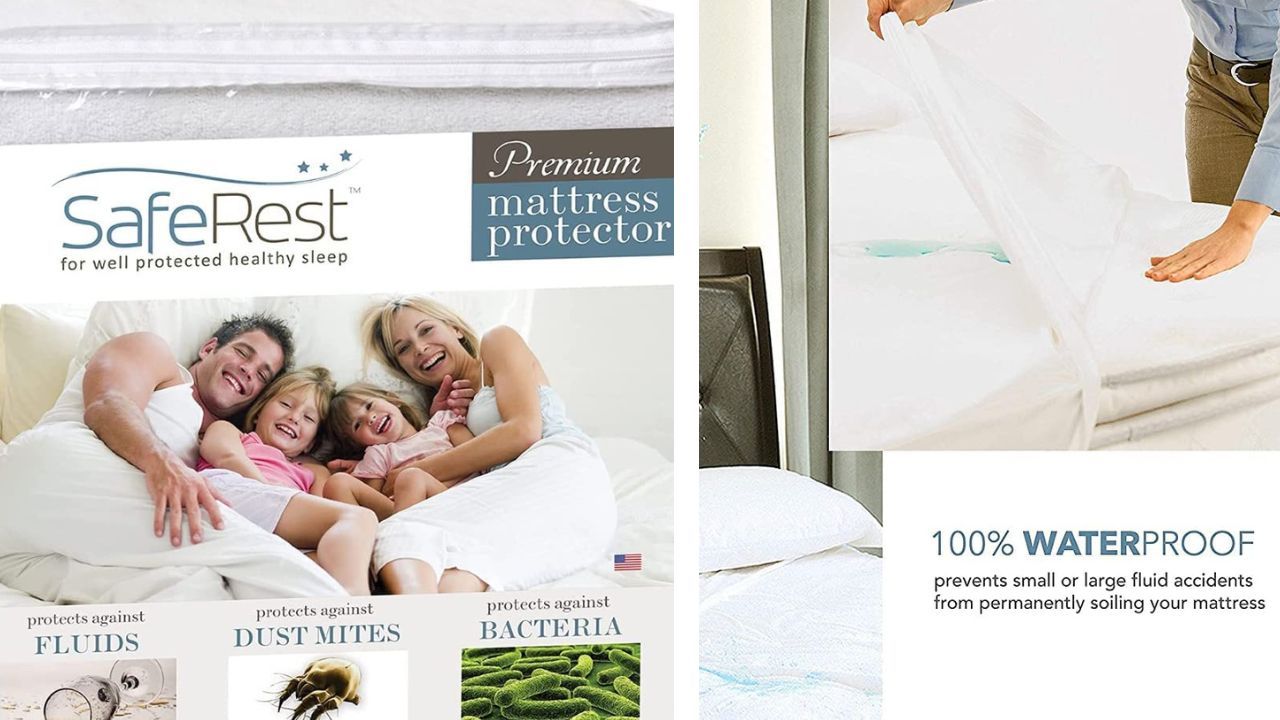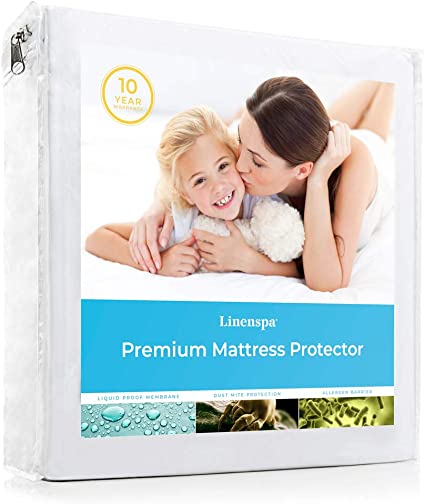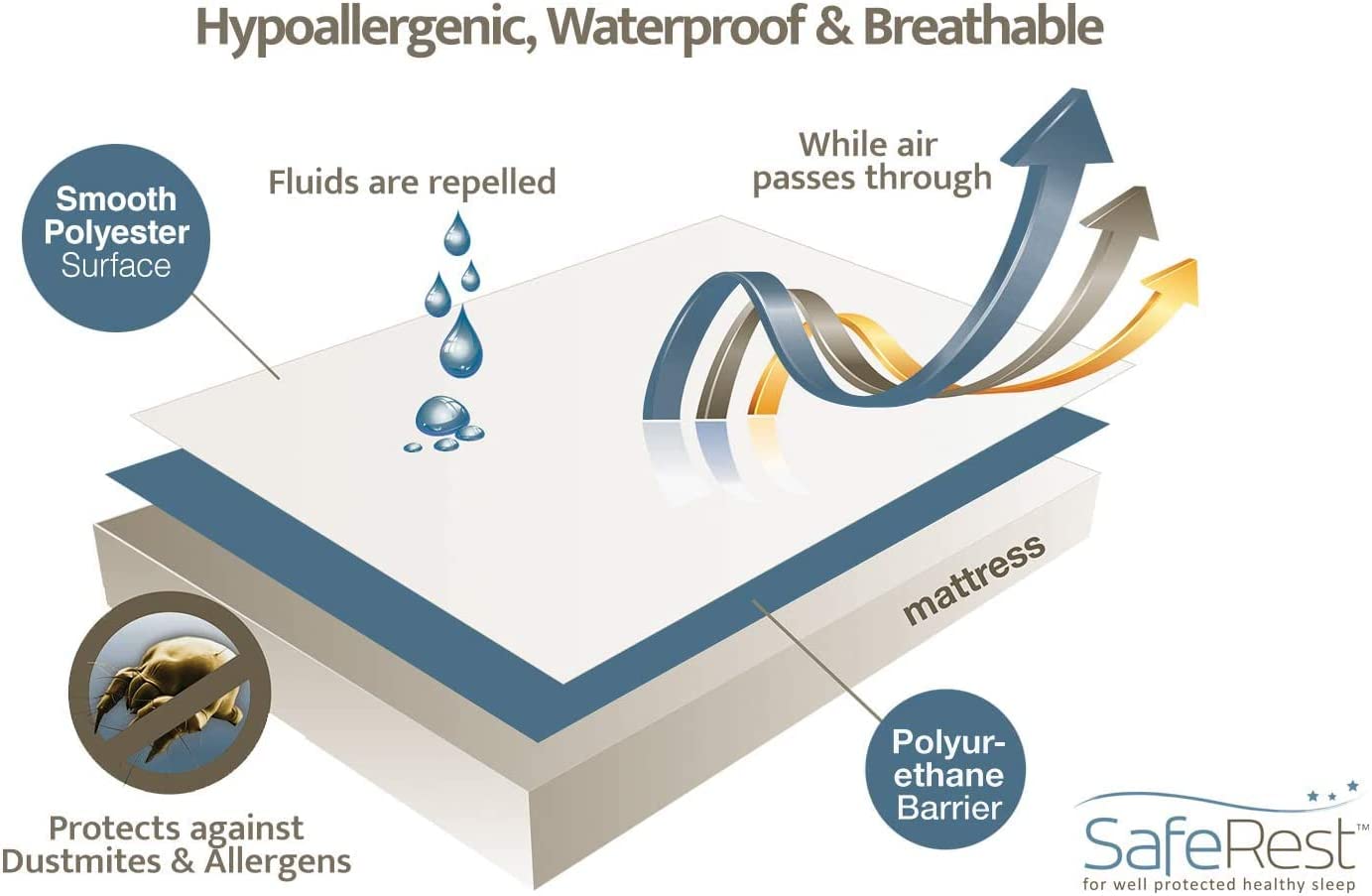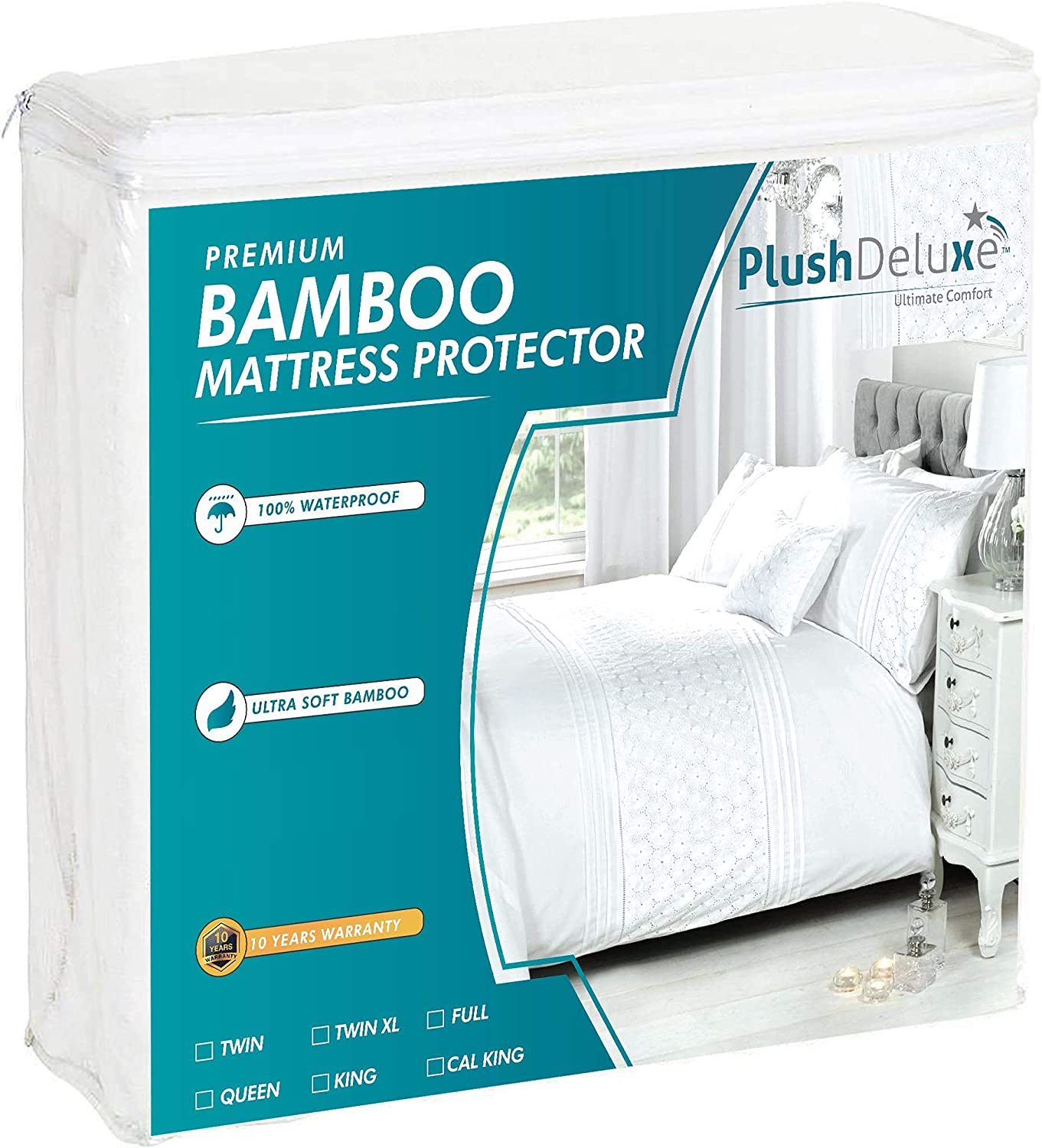Protect Your Mattress and Improve Your Sleep Quality with a Mattress Protector
Protect your mattress from dust, sweat, and other everyday dirt- You must read to see!

When shopping for a mattress, you’ve already made the important decision of what type of mattress is best for you and your sleep needs. However, one important element that's often overlooked in mattress shopping is a mattress protector.
Not only does a mattress protector protect your mattress from dust, sweat, and other everyday dirt and grime, it can also extend the life of your mattress and prevent it from needing to be replaced any time soon. But that's not all...not only does a mattress protector protect your mattress, it can also improve your sleep quality.
Read on to learn more about how a mattress protector can help you sleep better, the different types of mattress protectors available, and how to choose the right one that suits your mattress and sleep needs!
Quick Definition
What is the best mattress protector to buy?
Answer: Before purchasing a mattress protector, consider your needs and preferences. Make sure to research different types of mattress protectors, such as waterproof, hypoallergenic, or cooling options, to ensure you choose the best one for you.
What is a Mattress Protector?
A mattress protector is a protective layer that covers your mattress like a fitted bed sheet. It’s made of fabric, such as cotton-poly blend, and helps protect your mattress from spills, bacteria, dust mites, and other environmental factors which could lead to stains, odors, premature aging, and possibly more serious health risks.
Mattress protectors are widely available in different sizes and range in price from modestly priced basic models to high-end versions with advanced features such as temperature regulation or waterproof technology.
Some people may debate whether or not it’s necessary to invest in a mattress protector because bedding sheets provide some level of protection do for mattresses. While the main benefit of using mattress protectors is their additional layer of protection against dust mites, stains, and other external contributions to premature wear on a mattress, it's important to consider that mattress sheets will still require regular washing and can be subject to tearing over time which can cause indirect damage to your mattress.
Therefore investing in a mattress protector will ultimately help prolong the longevity of your mattress while providing extra peace of mind knowing that it's getting full protection from any external factors.
In conclusion, mattress protectors are relatively affordable additions that can provide substantial protection against external factors that can contribute to the premature wear and tear on a mattress. Unquestionably they bring peace of mind since they act as an extra barrier between the mattress and anything coming into contact with it. Now let's look into the benefits of having a mattress protector.
- A study found that 95.3% of consumers said they were satisfied with their mattress protector.
- According to a survey, 95% of respondents reported enhanced comfort when using a mattress protector on their bed.
- In an analysis, 90% of people who purchased a mattress protector saw an improvement in the quality and longevity of their mattress.
Benefits of a Mattress Protector
A mattress protector offers many important benefits, both for the mattress itself and for you as the sleeper. From providing an extra layer of comfort to extending the life of your mattress, it is clear that a mattress protector is a great way to enhance your sleep quality.
One of the greatest advantages of having a mattress protector is the protection from most types of spills and dirt. Whether you have children or pets who often find their way into the bedroom, an effective mattress protector will help keep them from staining and ruining your mattress.
Not only does this save you hundreds of dollars in potential cleanup costs, but it also saves you from having to replace your mattress prematurely.
Additionally, many mattress protectors are designed with special materials that are resistant to allergens such as dust mites and pet dander, which can exacerbate existing allergies or lead to new ones.
On the other side of the debate, some people argue that having an extra layer between you and your mattress can actually hinder sleeping comfort by making it harder to regulate body temperature at night and by altering how much cushioning you feel during sleep.
While these concerns are legitimate (and it's important to take them into account when picking out a mattress protector), many manufacturers design their covers with breathable material which allow air flow while still protecting the interior layer. And if comfort is a concern, there are options available that come equipped with layers of memory foam or latex as well.
Whatever option you choose, investing in a mattress protector is probably one of the best investments anyone can make for their sleep hygiene–and for their current and future mattresses too. It’s clear that the benefits greatly outweigh any potential drawbacks.
And with proper care, a good quality cover should last many years–protecting our beds and creating even better sleep experiences every night! From here, let's take a closer look at how owning a mattress protector can help protect against dust and dirt as well.
Protection from Dust & Dirt
One cannot underestimate the importance of protection from dust and dirt when it comes to the upkeep of a mattress. A mattress protector acts as an important line of defense between your mattress and any dirt, dust or allergens that may settle in should it come into contact with other surfaces. .
Having a mattress protector does not only prevent allergens from infiltrating, but can also help combat dirt buildup due to the transition of particles from elsewhere in your home.
Although some may feel uneasy about using a mattress protector because they think it will suffocate the mattress and disrupt air circulation, this is not true. Modern day protectors are made with breathable fabrics such as cotton, terry cloth, and hypoallergenic fibers which make them suitable for daily use without impacting airflow or temperature regulation.
Overall, investing in a mattress protector is more than worth it when you consider that it can effectively safeguard your mattress against dust and dirt.
With that being said, having a proper cover can also go some way towards keeping other nuisances like odors and moisture at bay.
Must-Know Points to Remember
Investing in a mattress protector is essential to the upkeep of any mattress and can prevent exposure to allergens, dust, dirt and other nuisances.
Modern day protectors are usually made using breathable fabrics such as cotton, terry cloth or hypoallergenic fibers which permit airflow and temperature regulation without compromising comfort.
Reduction in Odor & Moisture
While protecting your mattress from dust and dirt is a must, it is also important to keep it clean and fresh. A good way to do this is by reducing odor and moisture with a mattress protector—especially if you have allergies or asthma.
Mattress protectors are designed to keep out bedbugs, dust mites, spills, sweating, and other allergens.
What is the most effective way in combating odor and moisture? Studies show that waterproof mattress protectors are the most effective in preventing spills or sweat on the surface of the mattress and keeping odors at bay.
They can reduce the amount of dust mites living in your mattress by allowing less air flow than standard covers, so when combined with regular vacuuming, mattress cleaning and laundering, waterproof protectors create better odor control for people who are sensitive to environmental smells.
Some may argue that certain materials such as plastic become too hot during use, making it uncomfortable for some sleepers. With advances in protective fabric technology however, you can now find breathable fabrics that allow air flow while stubbornly repelling liquids and other contaminants from sinking into any areas of the mattress.
No matter which one you choose, be sure to check all safety standards before buying an item that will be sleeping next to you every night.
The journey towards a cleaner and less odorous sleeping experience starts with choosing a suitable mattress protector - but knowing what type is right for you requires understanding the different types available. In terms of material quality, breathability factors, specialty components and price points—the choices can be overwhelming.
That is why in our next section we will provide more information about how to select the best mattress protector for your needs.
Types of Mattress Protectors
The type of mattress protector you choose to use is extremely important in protecting your mattress and improving your sleep quality.
Protectors come in various styles, from traditional vinyl, or plastic protectors, to more modern fabric protectors and hypoallergenic protectors. Traditional vinyl and plastic protectors offer about a 3mm thick barrier between spills and liquids getting through to the bed.
They also offer a protection against dust mites, providing that air can circulate adequately. On the other hand, some people argue that the plastic will cause their mattress to overheat during the night due to lack of breathability.
Fabric mattress protectors are usually made from quilted cotton material with TPU (Thermoplastic Polyurethane) laminate on top, making it waterproof yet breathable. This allows for free circulation of air around your body while keeping the mattress dry and away from any potential spills or sweat.
Additionally, there are hypoallergenic protectors which are especially designed for those with allergies who need extra protection against dust mite and other allergens such as pet dander or pollen.
These will typically have an outer layer of ionized silver fibers that prevent bacteria build up, creating an inhospitable climate for these unwanted particles.
No matter what type of mattress protector you choose, make sure it fits tightly onto your mattress so no water or spills can seep through; this will ensure maximum sleep quality and protection for your mattress.
With the wide range of options available on the market nowadays, you are sure to find one that best fits your needs without compromising on comfort or hygiene.
Now if you're considering opting for a higher level of protection against allergens and pests whilst maintaining a comfortable climate when sleeping then fabric and hypoallergenic mattress protectors may be the way go.
Fabric & Hypoallergenic Protectors
The fabric mattress protectors offer comfortable, hypoallergenic protection for your mattress. They are constructed with a poly-cotton blend to provide superior comfort and breathability while also blocking dust mites and other allergens.
The fabric keep your mattress safe from tears, wear and tear, stains, sweat and other liquids that can ruin the mattress. Many of these fabric mattress protectors come with built-in pockets so you can store small items like pillows and extra sheets without having to take up space in your closet or drawers.
On the one hand, some people may argue that this type of bedding might not last as long as a waterproof cover because it’s made from more breathable materials.
On the other hand, those who prefer a cooler sleep temperature will appreciate the more breathable fabrics used in this type of protector. Additionally, evidence suggests that the poly-cotton fabric blend used in some of these protectors is both hypoallergenic and durable. For those looking for an affordable way to improve sleep quality by protecting their mattresses, a high-quality fabric protector could be a great option.
Ultimately, whether you choose a waterproof or non-waterproof mattress protector depends on your individual needs and priorities. Regardless of which you choose, the most important consideration is that your chosen protector offers maximum protection against accidents, stains and dust mites while still allowing your mattress to breathe properly during sleep.
Transitioning now to discuss another popular form of protection – waterproof and breathable protectors – let's look at what makes them different than their fabric counterpart and how they can add an extra layer of security for your mattress.
Waterproof & Breathable Protectors
When deciding on a mattress protector, waterproof and breathable protectors may be just what you're looking for. These bedding essentials are perfect for families with children or pets, or anyone who wants peace of mind knowing their mattress is safe from spills, accidents and general wear and tear.
Many waterproof protectors also come with a hypoallergenic lining or built-in antibacterial protection, providing both buoyancy and an extra layer of protection against allergens.
Proponents of waterproof and breathable protectors often point out that these products offer superior durability, as well as superior comfort.
The waterproof fabric is designed to stand up to repeated washings while still keeping the mattress dry and protecting it from dirt and dust mites. Some models also feature a cool-to-the-touch surface, making them more comfortable than other mattress protectors.
On the other hand, some critics argue that waterproof and breathable protectors are less effective in regulating temperature compared to traditional mattress protectors.
This is because the waterproof fabric prevents air circulation between the sheets and mattress which can cause sweat buildup. This could lead to an uncomfortable sleeping environment which may interfere with sleep quality.
Additionally, many waterproof protectors have been found to trap body heat more effectively than other types of protectors, leading to even more uncomfortable sleeping conditions.
However, there are ways around this issue when considering a waterpoof protector for your mattress. Breathable fabrics or moisture wicking materials like microfibers can help contribute to better air circulation while still maintaining some waterproof properties.
In addition, some newer models use advanced technology such as Heat Activated Technology (HAT) to keep the user's sleeping environment cool and comfortable while keeping the mattress safe from spills and accidents at the same time.
In summary, waterproof and breathable mattress protectors offer durable protection against spills, accidents and general wear and tear; however they should be chosen with care for those looking for superior comfort as well as functionality since traditional models may provide better temperature regulation during sleep.
We have researched and read thousands of reviews for mattress protectors on Amazon and have come up with the best mattress protectors that we can find for you. Click the Amazon button for the product that you are interested in so that you can get more information and the best prices.
1.SafeRest Mattress Protector
2.Linenspa Waterproof Smooth Top Premium Mattress Protector

Linenspa Waterproof Smooth Top Premium Mattress Protector
Best Mattress Protector
3.Premium Bamboo Mattress Protector
Frequently Asked Questions and Explanations
What should I look for when shopping for a mattress protector?
When shopping for a mattress protector, there are several important features to consider. First, look for one that fits your mattress snugly and won’t slide off or bunch up when in use.
It should also be made from a high quality fabric like cotton or bamboo that is breathable and will regulate temperatures—keeping you cool in summer and warm during the colder months.
Additionally, opt for a mattress protector with moisture-wicking capabilities to address temperature fluctuations and perspiration. Finally, make sure it comes with a guarantee so that you can rest assured knowing your purchase is protected.
What are the benefits of using a mattress protector?
Using a mattress protector offers a number of benefits to help improve sleep quality. Mattress protectors provide a barrier between you and your mattress, making it more hygienic by guarding against dust mites, bed bugs, pet dander and other allergens that can be found in mattresses.
As well as protecting your mattress from spills and stains, it can also extend its life span by keeping it clean and protecting it from wear and tear.
A mattress protector can also help make your mattress more comfortable by providing extra cushioning. This cushioning helps reduce pressure on aching joints while sleeping which can lead to improved sleep quality.
It can also make a softer bed surface more supportive or create a firmer one when needed. Finally, using a mattress protector is often recommended for those with allergies, asthma or sensitive skin so they can rest comfortably at night knowing their mattress is guarded against irritants.
How do I know which type of mattress protector is best for me?
Choosing the right mattress protector for your needs can be a daunting task. It’s important to consider factors like size, mattress type and material when selecting a mattress protector.
Firstly, you should make sure that the protector you choose is the proper size for your mattress. Though many mattress protectors are labeled as “universal fit”, some sizes may not fit properly on a smaller or larger than average mattress.
Secondly, consider what type of mattress you have—memory foam or innerspring—as this can impact the decision in guard against potential damage.
Memory foam mattresses require specialized waterproof protectors made from an absorbent material. For an innerspring mattress, a quilted protector with waterproof backing will provide better protection from dust mites and allergens.
Lastly, think about what material you prefer for your protector - cotton, polyester, or something else - and how that may influence wear-and-tear over time.
Some materials are more durable and breathable than others, so weigh those factors accordingly before deciding on a particular model.
Overall, selecting the right type of mattress protector requires mindful consideration of your own sleeping habits, preferences and lifestyle.
With some research and guidance, you can find the best protection for your bed that ensures that you get a good night's sleep every night!



